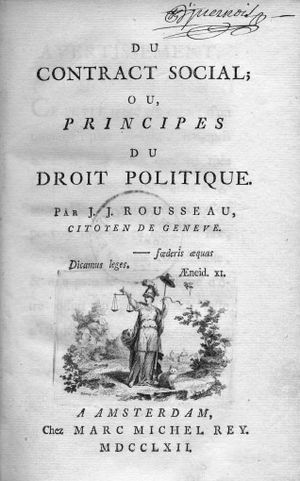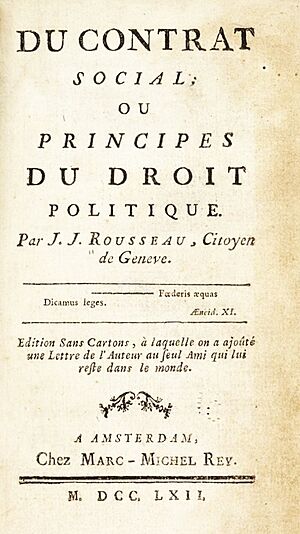The Social Contract facts for kids

Title page of the first octavo edition
|
|
| Author | Jean-Jacques Rousseau |
|---|---|
| Original title | Du contrat social; ou, Principes du droit politique |
| Country | France (edited in Amsterdam) |
| Language | French |
|
Publication date
|
1762 |
|
Original text
|
Du contrat social; ou, Principes du droit politique at Script error: The function "name_from_code" does not exist. Wikisource |
| Translation | The Social Contract; or, Principles of Political Right at Wikisource |
The Social Contract, also known as On the Social Contract; or, Principles of Political Right, is a famous book written in 1762 by a philosopher named Jean-Jacques Rousseau. He was from Geneva, which is now part of Switzerland.
In this book, Rousseau explored big questions about how people can live together in a community and still be free. He wondered how a government could be fair and have true power, especially when society was becoming more focused on business and money. Rousseau had already talked about some of these ideas in an earlier book called Discourse on Inequality.
The Social Contract was very important and helped inspire big changes and revolutions in Europe, especially the French Revolution. Rousseau argued against the idea that kings or queens had a special, God-given right to make laws. Instead, he believed that only the "general will" of the people should create laws. He thought that if people obeyed laws they helped create, they would truly be free.
Contents
What is the Social Contract?

Rousseau's book starts with a quote that means "Let us set equal terms for the truce." His main goal was to figure out if there could be a fair and rightful government. He felt that people living in his time were often worse off than they would be living alone in a "state of nature" (a time before societies and governments).
He believed that simply having power or being able to force people to do something does not make it right. In other words, "might does not make right." A country cannot simply enslave people it has conquered. People should only have to obey governments that are fair and have a true right to rule.
Freedom and Agreement
Rousseau argued that a government's power must allow people to keep their individual freedom. He thought that this kind of power could only exist if everyone agreed to it. This agreement is what he called the "social contract."
However, Rousseau's idea of the social contract was different from other thinkers before him. He believed that a person's right to freedom is something they can never give away. If people gave up their rights to an authority, they would lose their freedom. This would turn everyone's natural equality into a situation where some people were bossed around.
So, for Rousseau, the only real social contract is one where the people themselves become the rulers. He called the combined will of all the people the "general will." For this general will to be truly fair, it must create laws that apply equally to everyone. Rousseau thought that if people made their own laws, they would become even more free. He also believed that equality was very important for freedom. He felt that laws should help keep people equal and prevent huge differences in wealth.
Government's Role
Rousseau also explained that the "sovereign power" (the power of the people to make laws) should be separate from the "government." In his words, the government is the part that carries out the laws. This separation is important because the people (the sovereign) should not deal with small, specific details of how laws are applied. Doing so would make their laws less general and less fair.
So, the government must be a separate group from the law-making body. If the government goes beyond the rules set by the people, then the people have a duty to get rid of that government and start fresh.
Size of the State
Rousseau thought that the size of a country often affects what kind of government it has. He believed that a government is only as strong as its people. The larger the country, the more power the government needs to control its population.
He felt that a government led by a single ruler (a monarchy) could have the most power over people. This is because it spends less effort on managing itself. A government where everyone participates (a direct democracy) would have the least power. Generally, the bigger the group of people running the government, the more power is needed to keep things organized.
Rousseau used the word "democracy" to mean a government where all or most people are directly involved in running things, not like today's representative democracy where people elect others to represent them. He argued that the people themselves, not their representatives, have the highest power. He believed that everyone taking part in making laws helps prevent power from being misused.
Because of the link between population size and government style, Rousseau thought that small places, like his home city of Geneva, were the best places for freedom to grow. For small states, he preferred an elected aristocracy (where a small group of respected people rule). For very large states, he thought a good monarch could work. But even a king's rule, to be fair, must follow the laws made by the people.
See also
- George Mason Memorial, Washington, D.C., includes Du Contract Social as an element of the statue of a seated Mason.
- Totalitarian democracy
 | Janet Taylor Pickett |
 | Synthia Saint James |
 | Howardena Pindell |
 | Faith Ringgold |

